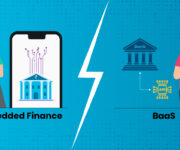With Fintech, the financial sector has rapidly adapted to the changing technology landscape. Fintech has enabled financial institutions and banks to provide personalised digital services. This increasingly popular solution is known as Fintech-as-a-Service (FaaS).
FaaS provides a complete stack of payments, commerce, and financial services capacities integrated into any application – web or app.
This article discusses how Fintech-as-a-Service is evolving and securing digital solutions to change the way transactions are done.
What is Fintech-as-a-Service or FaaS?
Fintech, the catch-all for “financial technology”, helps scale up, streamline, digitise, or disrupt traditional financial services. By offering fintech services, also known as Fintech-as-a-Service (FaaS), the FaaS service providers use APIs to integrate financial capabilities into clients’ existing applications, products, and services.
As such, FaaS enables businesses to leverage fintech solutions to optimise their end-to-end processes, delivering the best experiences to their clients and delivering commercial services to much higher standards than in the past.
According to the Market Data Forecast, the global financial technology market is expected to reach a market valuation of around $324 million by 2026.
FaaS can be provided in three principal areas:
- Systems: Banks and financial institutions use technology to make corporate and process up-gradation, either internally or as participants. Example: a mobile payment system.
- B2C: FinTech companies compete against incumbent banks and other financial institutions for market share. This can be done by reimagining conventional services and products such as loans and payment services for better user experience and customer value or providing technology to build a market that traditional financial service providers have failed to meet. Some fintech firms also assume the role of P2P lending and insurance platform.
- B2B: Here, a bank is a client or partner to a fintech company, where it could invest, purchase, or work with the latter to co-develop FinTech products.
Read more: Banks and FinTech: Rivals or Partners?
How Can Fintech-as-a-Service Companies Help?
The enormous legacy infrastructure of traditional banks with physical offices has several shortcomings. These shortcomings include, but are not limited to—slow digital transformation, absence of customer customisation, and inconsistent customer service.
FaaS platforms aim to solve these loopholes of legacy banks by meeting the current market demands.
Today, small and medium-sized businesses need quality information, confidence, timely and reliable financial performance. These businesses need to integrate their business strategy, financial strategy, and accounting streams to address the economic challenges.
This is exactly what FaaS providers offer, which can help these companies focus on the business side of things, consolidating all value streams in one place and saving up on full-scale services.
Here are some advantages of FaaS:
- Faster time to market: The use of a third-party payment platform to implement the payment flow and bring a product to the market is agile about developing the entire system from ground zero.
- Less processing costs: FaaS platforms enable merchants to direct their online transactions via payment service providers (PSPs), which gives merchants the option to choose providers for their transactions. FaaS providers also enable automation, improve financial reporting, and address companies’ unique needs that significantly reduce costs.
- Customisation: FaaS platforms tend to be customisable with easy development and maintenance in most instances.
- Fraud prevention: Since merchants do not have to develop their payment gateways, opting for a FaaS platform that follows compliance rules can help avoid online payment frauds. FaaS solutions also integrate financial management systems to allow higher transaction volumes while ensuring fraud reduction.
- Scalability: FaaS providers are appropriately structured and can provide companies with the right level of resources for specific tasks. Compared to an in-house department, FaaS providers allow companies to be more scalable by setting up suitable systems and streamlining processes.
Fintech Trends you Can’t-Miss!
FaaS solutions are already transforming how consumers access and access financial services.
The future of FaaS looks bright with virtual reality, robotic process automation, DeFi, smart contracts and artificial intelligence. Here are some domains which are propelling the FaaS revolution:
Blockchain
Blockchain, the technology behind Bitcoin and other cryptocurrencies has been increasingly acting as the infrastructure of the digital world lately.
It can disrupt the financial services industry through trends like digital payments, smart contracts, decentralised finance (DeFi), identity management and much more.
As blockchain gets increasingly adopted, Fintech companies can leverage their solutions with security, scalability, and decentralised solutions.
Mobile payments and digital banking services
Neobanks is increasingly becoming one of the most popular fintech services. Customers can open an account using mobile applications instead of visiting a brick-and-mortar branch.
They offer better functions such as account management, security checks, payment processing, verification, and risk assessments with technical expertise.
Open Banking
Open banking allows banks to connect third-party APIs to their banking platforms with use-cases such as personalised offerings and payment suggestions based on past spending habits or transaction history.
With APIs, third parties have easier access to the financial information that facilitates the creation of various applications. In addition, open banking encourages companies to come together and offer product packages that complement each other.
Robotic Process Automation (RPA)
RPA uses programs (bots) or digital robots to automate repetitive and routine activities. This can help businesses free up resources, improve accuracy, and be used in simple tasks such as information processing and data entry.
RPA ensures operating costs in Fintech companies without compromising quality or productivity.
Smart Contracts
Smart contracts are gaining widespread use and are available to optimise business and financial processes with their self-executing and self-enforcing abilities. This new form of agreement can improve the accuracy and verification of global transactions and solve the issue of trust in conditional transactions. In addition, automating the flow of payments and digital assets can foster new business models and products within Fintech.
Finezza is a leading credit evaluation and lending lifecycle platform that assists banks and NBFCs in optimising and streamlining their performance. Contact us at contactus@finezza.in to know more.




Leave a Reply